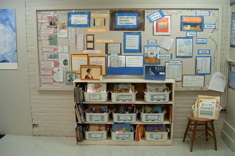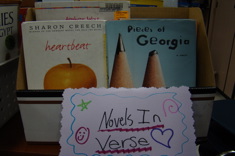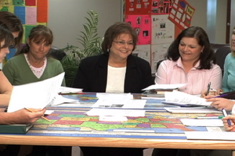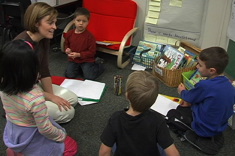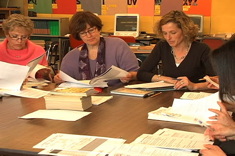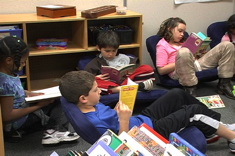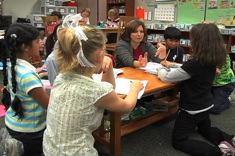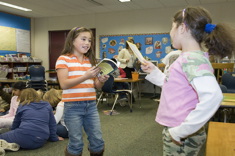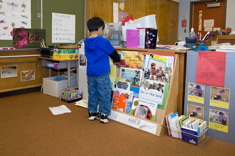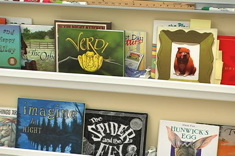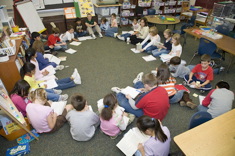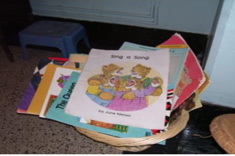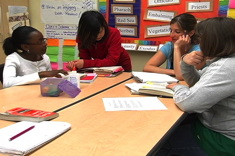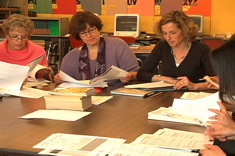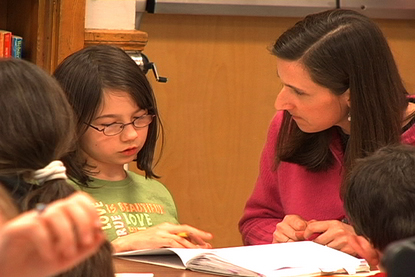Articles
Here is where you’ll find all the latest print features from our contributors. If you’d like to browse specifically by grade level, topic, or contributor, you can use the links in the right sidebar.
Latest Content
Rethinking a Study of Nonfiction Writing
Franki Sibberson reflects on her nonfiction writing unit, and realizes she emphasizes research skills at the expense of the craft of nonfiction writing.
Novels in Verse (BOOKLIST)
Franki Sibberson provides a booklist of "novels in verse" – a genre intermediate readers enjoy, especially those who struggle with longer texts.
Questions and Answers about Home Reading Logs
Readers enjoyed Mandy Robek’s explanation of her move to home reading logs in a calendar format, and some wrote in with additional questions about the program. Mandy provides a follow-up article in a question and answer format, addressing issues raised by readers.
Hallmarks of Reading Workshop
Karen Szymusiak works with her staff to develop "Hallmarks of Reading Workshop," which is a succinct and concrete list of expectations for time, components, and organization of workshops. The list would be an excellent jumping off point for discussion in a staff meeting of bottom-line standards and allocation of time for literacy activities.
Eight Tips for Building Relationships: A Tale of Two Literacy Coaches
Shari Frost presents a tale of two literacy coaches – one who has had success building close relationships with colleagues, and one who has struggled. In analyzing their experiences, she presents eight practical strategies for building relationships over time.
Better Discussions in Study Groups
Cindy Hatt has suggestions for getting the most out of book studies with colleagues, with activities and prompts that can help you move from ideas to practice in classrooms.
Teaching Economics with Children’s Literature
Mandy Robek shares some of her favorite children’s books for teaching economics.
Time Quote Collection
Quotes about time that have. . .well, stood the test of time.
Reflecting on Student Work in Staff Meetings (TEMPLATE)
Jennifer Allen describes a protocol for analyzing student work in teacher study groups and staff meetings, and includes a template for discussing classroom artifacts.
Overcoming Tears and Fears: Developing Criteria for Flexible Groups
Katie DiCesare comforts a student in tears at the end of the day, and realizes part of the problem may be that she moved the child into a guided writing group too quickly.
Wide Open Spaces: Learning from “Not-Just-Right” Books
When is it okay for a child to read a "not-just-right" book, especially one with themes that might be a bit sophisticated or of questionable taste? Andrea Smith confronts this issue as a parent, and thinks through what it might mean for her teaching.
Moving from Data to Practice
Clare Landrigan and Tammy Mulligan give advice for how to create databases and graphic analyses of assessment information that teachers can readily access and use.
The Draw-a-Reader Test: Informal Assessment Supporting Teacher Inquiry
The Draw-a-Reader test from Suzy Kaback is a fun way to get to know the readers of any age that also provides insight into their background knowledge and personal reading histories.
Tips for Saving Time from Literacy Leaders
Time-saving tips from contributors including Aimee Buckner, Debbie Miller, Ruth Shagoury, Shari Frost, Karen Szymusiak and "The Sisters" (Gail Boushey and Joan Moser).
Easing into Assessments During the First Six Weeks of School
Franki Sibberson and Karen Szymusiak have suggestions for integrating observations and assessments of students naturally into reader's workshops during the first six weeks of school.
“I Used to . . . Now I”
Looking for a thoughtful and feel-good icebreaker for a staff meeting or study group? Ruth Shagoury uses the “I Used to…Now I” prompt to get colleagues thinking and talking about changes in their literacy instruction over the years, as well as where they might go next in their teaching.
Books that Invite Student Participation
Franki Sibberson has suggestions for read-alouds that encourage kids to participate.
Characters We Love (BOOKLIST)
Nothing hooks kids on books more than a favorite character. Franki Sibberson presents some series books with intriguing characters that will delight your students.
Multicultural Books for Beginning Readers
“Why isn’t there an African American Henry and Mudge?” asks a teacher. This question leads Shari Frost on a quest to find the best early readers for multicultural students. In this booklist, she highlights her top picks.
Music for Literacy Leaders
Reflective? Rollicking? If you’re trying to set a tone for anything from an assessment team meeting to a one-minute transition in a second-grade classroom, our Music for Literacy Leaders playlist has just the right song for you.
Starting the School Year: A Checklist for Literacy Coaches
With all the checklists for launching the school year available for teachers, isn't it about time someone developed one for literacy coaches? Jan Miller Burkins has done just that – her Launching the Year Checklist is concise, and tackles everything from reformatting computer files to touching base with each teacher.
Letting Students Define and Design My 6th Grade Classroom Library
Katie Doherty's 6th graders take charge of the classroom library, with an activity designed to build an understanding of genre at the same time.
Making Time for Nonfiction Read Alouds
Franki Sibberson considers the issue of selecting nonfiction books for read-aloud time, and in doing so creates one of her popular booklists.
Literary Nonfiction: Models for Writing
Literary nonfiction is emerging as a popular genre. In this booklist, Franki Sibberson shares mentor texts for writing literary nonfiction.
Whatever Happened to Mrs. Wishy Washy?
Shari Frost notices a neglected tub of big books, and goes on the hunt for shared reading practices among teachers and literacy coaches.
Middle School Readers at Mid-Year (SURVEY TEMPLATE)
Katie Doherty finds surveys of student reading habits and preferences are really useful in the winter, after she knows her students and they’ve settled into a routine.
Learning with Intensity: A Study Group Discussion Prompt
"Learning with Intensity" is a study group activity which takes participants back to a time when they became passionately involved with learning. Ruth Shagoury shares the structure of the activity and insights from one group who gave it a test drive.
Creating Structures to Sustain Our Work
Jennifer Allen explains how she enlisted teachers to lead a day-long inservice.
Ode to a Sweet Snowy Day for Two
Shirl McPhillips’ poem “Ode to a Sweet Snowy Day for Two” is designed for paired reading. Shirl also gives advice for celebrating poetry as an oral art in classrooms.
Messengers
This is a lovely poem with a message about how poetry can move us, and why it is essential in classrooms.
Browse Content By
Type
Category
- Assessment Tools
- Big Fresh Archives
- Booklists
- Choice Numeracy
- Classroom Design
- Common Core
- Community Building
- Conferring
- Content Literacy
- Digital Literacy
- English Language Learners
- Equity
- Family Relations
- Free Samples
- Guiding Groups
- Leadership
- Literacy Coaches
- Mentor Texts
- Minilessons
- New Teacher Mentors
- Podcasts
- Poetry
- Quote Collections
- Reading Strategies
- Self Care
- Struggling and Striving Learners
- Talking and Listening
- Teacher Study Groups
- Teaching Reading
- Teaching Writing
- Word Study and Vocabulary
Author
- Melissa Quimby
- Nawal Qarooni
- Gwen Blumberg
- Julie Cox
- The Lead Learners
- Hannah Tills
- Josie Stewart
- Ruth Metcalfe
- Mallory Messenger
- Becca Burk
- Jodie Bailey
- Vivian Chen
- Mary Brower
- Tiffany Abbott Fuller
- Stephanie Affinito
- Ruth Ayres
- Leigh Anne Eck
- Heather Fisher
- Shari Frost
- Julie Johnson
- Suzy Kaback
- Gigi McAllister
- Shirl McPhillips
- Melanie Meehan
- Cathy Mere
- Debbie Miller
- Tara Barnett and Kate Mills
- Tammy Mulligan
- Dana Murphy
- Bitsy Parks
- David Pittman
- Brenda Power
- Heather Rader
- Matt Renwick
- Mandy Robek
- Christy Rush-Levine
- Gretchen Schroeder
- Jen Schwanke
- Brian Sepe
- Katherine Sokolowski
- Stella Villalba
- Jennifer Vincent
Grade Level
Choice Literacy Membership
Articles
Get full access to all Choice Literacy article content
Videos
Get full access to all Choice Literacy video content
Courses
Access Choice Literacy course curriculum and training

